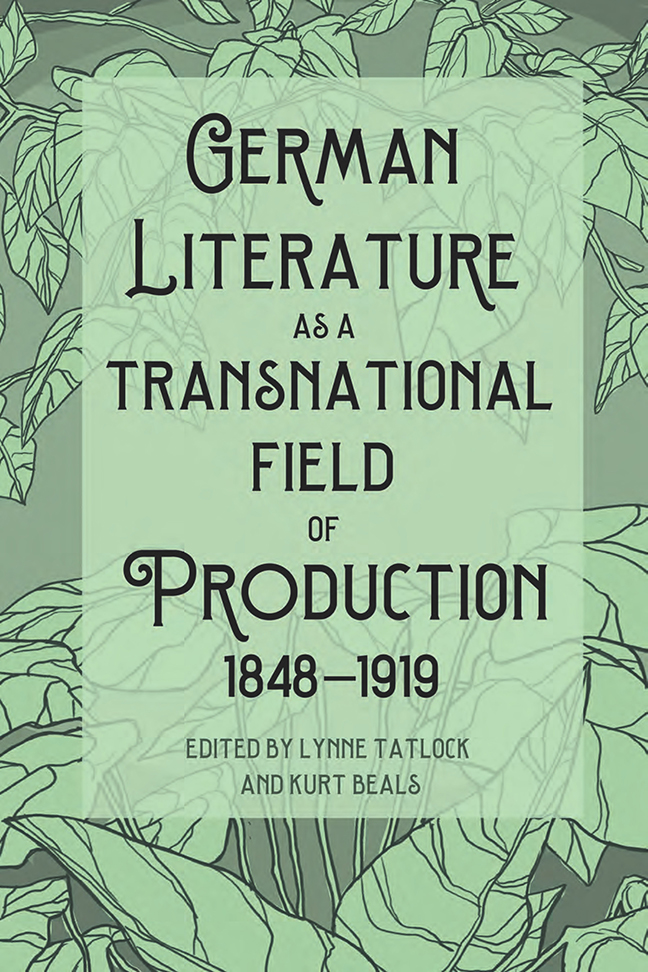Book contents
- Frontmatter
- Contents
- Acknowledgments
- Introduction: A Transnational Literary Field in the Age of Nationalism
- 1 The Passion of Johannes Scherr: Historiography as Trauma
- 2 Between Integration and Differentiation: On the Relationship between German and Austrian Literature in the Second Half of the Nineteenth Century
- 3 Reading Stifter in America
- 4 Travel Writing and Transnational Marketing: How Ida Pfeiffer brought the World to Austria and Beyond
- 5 Ernst Brausewetter's Meisternovellen Deutscher Frauen (1897–98): Gender, Genre, and (Inter)National Aspiration
- 6 Arbiter of Nation? The Strange Case of Hans Müller-Casenov's The Humour of Germany (1892/1893)
- 7 Visualizing the End: Nation, Empire, and Neo-Roman Mimesis in Keller and Fontane
- 8 Eurocentric Cosmopolitanism in Thomas Mann's Buddenbrooks
- 9 European Peace from a Transatlantic Perspective: Victor Hugo and Bertha von Suttner
- 10 Hermann Graf Keyserling and Gu Hongming’s Ethics of World Culture: Confucianism, Monarchism, and Anti-Colonialism
- 11 Constructing Symphonic Worlds: Gustav Mahler, Weltliteratur, and the Musical Program
- 12 The Garb of National Literature: Transnational Identities and the Early Twentieth-Century Schriftstreit
- 13 From European Symbolism to German Gesture: The International and Transnational Nationalism of Stefan George's Blätter für die Kunst
- 14 Canon Fire: Dada's Attack on National Literature
- Selected Bibliography
- Contributors
- Index
5 - Ernst Brausewetter's Meisternovellen Deutscher Frauen (1897–98): Gender, Genre, and (Inter)National Aspiration
Published online by Cambridge University Press: 10 January 2024
- Frontmatter
- Contents
- Acknowledgments
- Introduction: A Transnational Literary Field in the Age of Nationalism
- 1 The Passion of Johannes Scherr: Historiography as Trauma
- 2 Between Integration and Differentiation: On the Relationship between German and Austrian Literature in the Second Half of the Nineteenth Century
- 3 Reading Stifter in America
- 4 Travel Writing and Transnational Marketing: How Ida Pfeiffer brought the World to Austria and Beyond
- 5 Ernst Brausewetter's Meisternovellen Deutscher Frauen (1897–98): Gender, Genre, and (Inter)National Aspiration
- 6 Arbiter of Nation? The Strange Case of Hans Müller-Casenov's The Humour of Germany (1892/1893)
- 7 Visualizing the End: Nation, Empire, and Neo-Roman Mimesis in Keller and Fontane
- 8 Eurocentric Cosmopolitanism in Thomas Mann's Buddenbrooks
- 9 European Peace from a Transatlantic Perspective: Victor Hugo and Bertha von Suttner
- 10 Hermann Graf Keyserling and Gu Hongming’s Ethics of World Culture: Confucianism, Monarchism, and Anti-Colonialism
- 11 Constructing Symphonic Worlds: Gustav Mahler, Weltliteratur, and the Musical Program
- 12 The Garb of National Literature: Transnational Identities and the Early Twentieth-Century Schriftstreit
- 13 From European Symbolism to German Gesture: The International and Transnational Nationalism of Stefan George's Blätter für die Kunst
- 14 Canon Fire: Dada's Attack on National Literature
- Selected Bibliography
- Contributors
- Index
Summary
In 1899, the literary critic Eduard Höber favorably reviewed Ernst Brausewetter's two-volume anthology Meisternovellen Deutscher Frauen (Master Novellas by German Women, 1897–89), noting its special merit in these times, “wo an dem deutschen Dichterhimmel neben den Sternen männlichen Geschlechts plötzlich eine so erstaunliche Zahl weiblicher Leuchten aufgetaucht ist” (when such an astonishing number of female lights have suddenly popped up alongside the male stars in the German firmament of [male] poets). The collection, that is, offered contemporary readers new clarity and insight into a field that had become differently configured as bright female novae popped up among the fixed male stars that had hitherto determined the contours of the German literary heavens. Brausewetter's Meisternovellen and its broader literary context merit a closer look in connection with the aims of the present anthology. As this essay will show, while its title may appear simply to signal a national project when it asserts women's literature as national literature, this publication, fueled by both global social changes and international competition, in effect reorders the field of cultural production. Indeed, Höber's imagined German “Dichterhimmel” with its female novae was conjoined with an international star map.
Brausewetter (1863–1904) had worked with a wide lens before he focused his literary telescope on German women writers. As a premiere translator of Scandinavian literature, including works by August Strindberg, Henrik Ibsen, Hermann Bang, Knut Hamsun, Karl Gjellerup, and Selma Lagerlöf, among others, for multiple German publishers, he mediated international literature for German-language readers from the late 1880s until his death in 1904 as part of the late-century Scandinavian vogue. In 1896, the freelancer took on new roles as editor and amateur scholar with the belletristic Berlin publisher Schuster & Loeffler to produce first the anthology Nordische Meisternovellen (Nordic Master Novellas, 1896), featuring his own translations, and thereafter the twovolume Meisternovellen Deutscher Frauen. This second undertaking introduced a German-language readership not to foreign literature per se but to fiction by women writing in German, work that was alien to that readership in a different sense.
Meisternovellen Deutscher Frauen comprises two volumes of fiction by thirty-two women writers. An author portrait and a literary-critical essay by Brausewetter himself introduce each selection. Formulating the work's intention, an advertisement for the volume declares that it follows the Nordische Meisternovellen in its arrangement and configuration. Yet Brausewetter and his publisher frame the second project differently.
- Type
- Chapter
- Information
- Publisher: Boydell & BrewerPrint publication year: 2023



